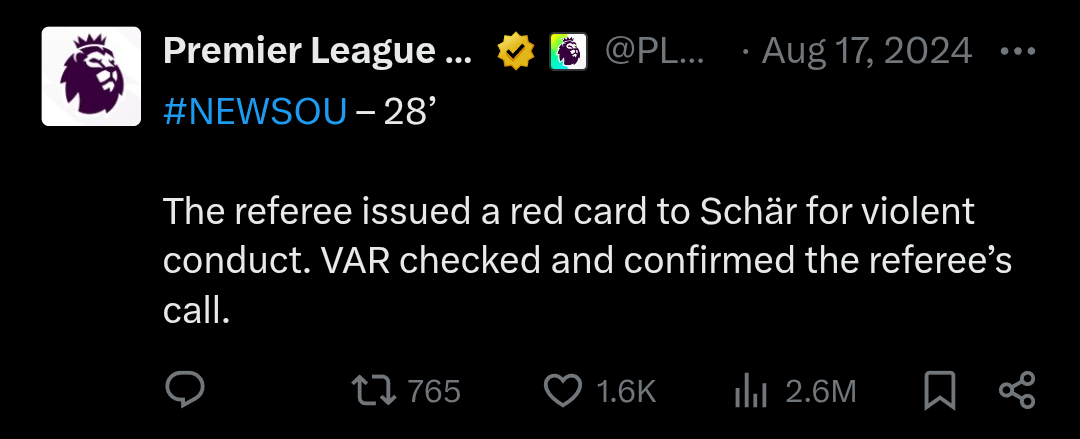What next for VAR?
Another week, another VAR controversy. Once again, VAR has entered the spotlight after failing to overturn Myles Lewis-Skelly’s controversial red card in the Wolves vs Arsenal game at Molineux on Saturday. The incident, which ex-England striker, Alan Shearer, described as “one of the worst decisions I’ve seen in a long time” has sparked heated debates online over the use of VAR in England. In this post, I look at 5 potential solutions to the issues facing VAR .
Pictured above: the Premier League Match Centre responds to the sending off of Myles Lewis-Skelly
1: Recruit better VAR officials
Probably the most obvious solution is to improve the quality of VAR officials. Darren England who was the VAR at Molineux on Saturday, also oversaw the Tottenham vs Liverpool game last season, when a VAR mix-up led to Luis Diaz’s goal being incorrectly ruled offside.
It’s clear that some VAR decisions have resulted from individual mistakes. However, human error is inevitable from time to time and the frequency of VAR controversies, suggests there is a more fundamental issue at play.
2: Lower the bar for intervention
Currently, the bar for VAR intervening is “clear and obvious errors” in respect of goals, red cards, penalties and mistaken identity. Prevailing interpretations of “clear and obvious” are pushing this bar to an increasingly unattainable level. Intervention seems to be limited more often than not, to a rare set of scenarios in which VAR is unable to find any way to interpret an incident in the same way as the on-field referee.
A few cases in point. Let’s start with Myles Lewis-Skelly. Whilst it seemed a very harsh red card, Mike Dean pointed out on Sky Sports that you can find a way to interpret the tackle as a red card. It’s likely Darren England used this logic in concluding it was not a clear and obvious error. The same underlying reason may explain other decisions which have been left unchallenged this season, such as João Pedro’s attempted elbow vs Brentford, Fabian Schär’s “headbutt” vs Southampton, Moises Caicedo’s reckless challenge against Tottenham and so forth. Across all these decisions, there is a common problem - had they been given the other way round, VAR would not have overturned them. Indeed, had the on-field referee seen the replays that viewers had seen at home in these scenarios, there is a real question as to whether they would have made the same decision.
Pictured above: the Premier League Match Centre responds to the sending off of Fabian Schär
There is a good argument that the bar for VAR recommending an on-screen review should therefore be lowered to something like “if the referee had seen these angles, do we think the referee would have acted differently?” This would help reduce the problem, which VAR was perhaps intended to solve in the first place, of referees not having access to replays and therefore making decisions based on incomplete information.
As always, there is a balance to be struck between accuracy and efficiency, but a slight increase in review time may be a small price to pay for better informed decision making.
3. Scrap VAR
VAR was designed to get rid of controversy, but it seems like every week VAR is at the centre of another storm. VAR has various other drawbacks. Goal celebrations are often muted for fear the goal might be ruled out and long periods of time are regularly spent waiting for VAR reviews. If VAR is impacting games negatively and not doing what it was designed for, there is a real question as to whether we should keep it.
However, whilst scrapping VAR would make games flow better, it would leave us back where we started, with controversial on-field decisions left to stand. It’s unlikely the Premier League would take this approach.
4: Allow referees to initiate reviews
This is an idea that has been used in Rugby Union with a fair amount of success. Under a self-referral system, referees could request assistance from a remote referee on important decisions or request to view replays of incidents on screen. The VAR could also communicate with the referees on these decisions if there is something the referee has missed.
Like lowering the bar for intervention, this would give the on-field referee better tools to make informed and accurate decisions.
5: Allow coaches/captains to challenge calls
Most sports in the USA have a system where teams can challenge the referee’s call. A similar arrangement could be tried in the Premier League, whereby teams use ‘challenges’ to refer contentious decisions to an independent television match official.
Although this would give teams more power to challenge calls in real time, it would slow games down a lot. For example, if each team was given three challenges and each challenge took just two minutes, this would add an extra 12 minutes to each game.
Verdict
Dissent is growing around VAR and pressure is mounting on the Premier League to take action. It’s unlikely VAR will be scrapped, but something needs to be done quickly if its credibility is to be saved.
The fundamental issue is that VAR is not fulfilling its original purpose. It was supposed to reduce the number of incorrect calls caused by referees not having access to television replays. However, on-field referees are still getting big calls wrong due to incomplete information. These incorrect calls are often decisions those referees would have made differently, had they seen the replays.
There are strong arguments therefore, for either lowering the bar at which VAR intervenes or introducing a system where the on-field referee could ask for a second opinion or video replay.

